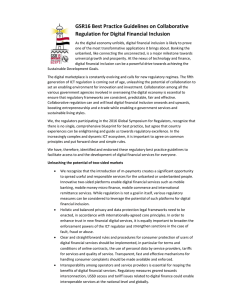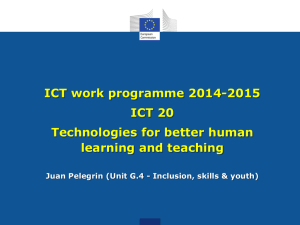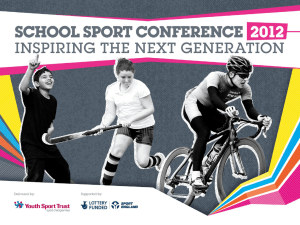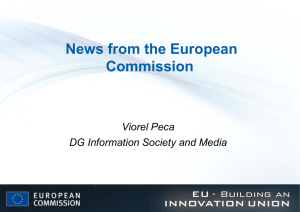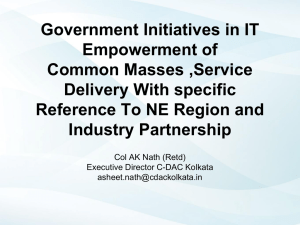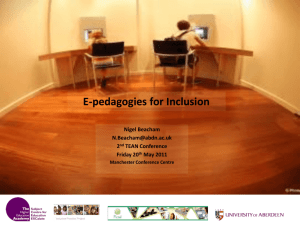Marco Marsella, presentation, powerpoint , opens
advertisement
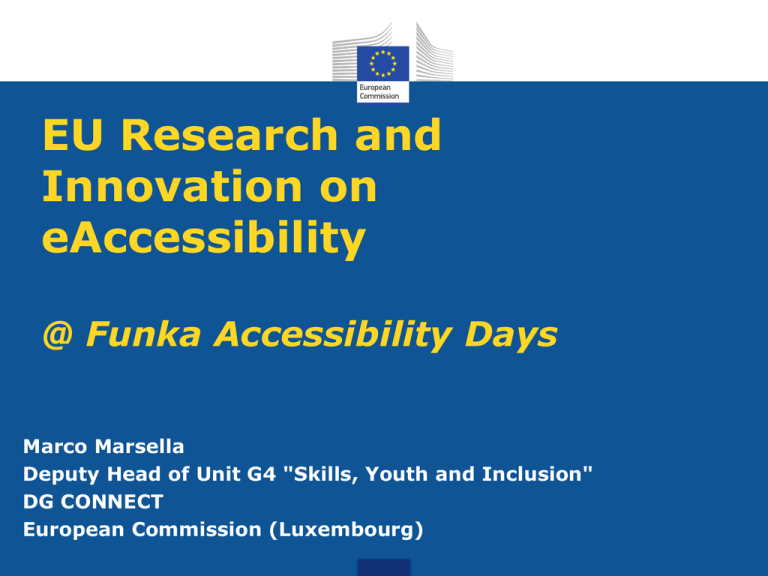
EU Research and Innovation on eAccessibility @ Funka Accessibility Days Marco Marsella Deputy Head of Unit G4 "Skills, Youth and Inclusion" DG CONNECT European Commission (Luxembourg) ICT and Inclusion ---- ICT for wider inclusion ---- Lowering obstacles Objects of enquiry --- Knowledge --- Interactions --- Behaviours Policy context Dec June Nov April May July June 2006 UNCRPD 2005 European i2010 2008 Riga Ministerial Declaration Digital Agenda Pillar VI 2011 2010 2010 Disability Strategy 20102020 2012 Mandate 376 Phase 2 Proposal for Web Accessibility Directive ICT and inclusion @ DG CONNECT Funded projects: target users Motor impaired Learning needs Cognitive disabilities Visually impaired Community Developers Industry Physical and Stakeholders cognitive disabilities Immigrants NEET / Social actors Groups at risk of exclusion Carers Carers H2020: Three priorities •Excellent science •Industrial leadership •Societal challenges Coverage of the full innovation chain Societal challenges Industrial leadership Excellent science Basic Research Demonstration Technology R&D Prototyping Large scale validation Pilots Market uptake Mainstreaming innovation: How? • Market orientation • Incremental and disruptive innovation • R&I and Entrepreneurship • SMEs leading innovations • Risk capital for SMEs • Innovation in selection of projects ICT and inclusion in H2020 WP 2014 – ICT 22.b Multimodal and Natural computer interaction Develop multi-modal adaptive interfaces assisting people with disabilities Research and Innovation Action • Users interaction and cooperation • Behaviours, emotions and intentions • Sensing and understanding the environment • Multimodal interaction • Interoperability standards Call 22.b - Expected Impact • Advancing the capacity of human-machine technologies for people with disability and elderly R&I Actions • Small project proposals: maximum 3M • Budget 16 M € • Closing: 23 April 2014 ICT and inclusion in H2020 WP 2014 – ICT 21 Advanced digital gaming/gamification technologies • New digital games and gamification techniques in non-leisure contexts for the market • Building scientific evidence for governments, enterprises and individuals Innovation Action • Technology transfer for non-leisure applications by digital games SMEs • Small scale experiments • For learning and skills acquisition and for empowerment and social inclusion • Scientific evidence of effectiveness for target groups or problems Call 21 - Expected Impact of IA • Increase the collaborations between digital game industry and research community R&I Actions • Small project proposals: maximum 3M • Budget 8 MEUR • Closing: 23 April 2014 Thank you • DG CONNECT • Unit G4 Skills, Youth, Inclusion • LUXEMBOURG
